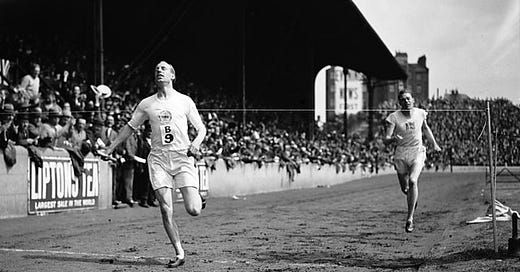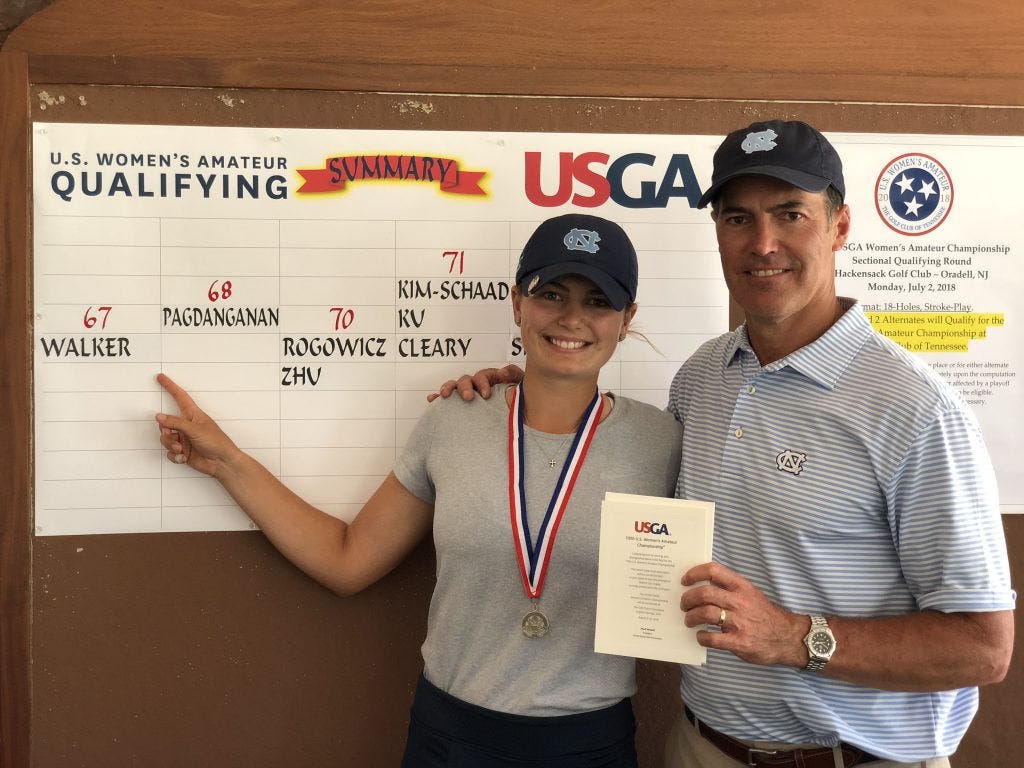The 100 Year Anniversary of Eric Liddell's Olympic Gold
Recounting the impact Eric Liddell has had on my life in honor of his 100 year anniversary.
This is Eric Liddell, an Olympic gold medalist from the 1924 Paris Olympics.
Exactly 100 years ago today, he won an Olympic gold medal in the 400-meter race, despite it not being his best event.
Liddell was primarily known as a 100-meter sprinter, but the heats for those events were scheduled on Sunday. As a devout Christian, he believed Sundays were a day of rest and refused to compete on the Sabbath, willingly giving up his chance to compete in his strongest event at the Olympics.
Recognizing his dilemma, the Olympic committee granted him the opportunity to compete in the 400 meters, where he went on to secure the gold medal.
Beyond his achievements as an Olympian, Liddell was also a missionary who used his platform to share his faith and inspire others.
His remarkable story was told in the acclaimed movie "Chariots of Fire," which remains my favorite film to date.
Even more than a century later, Eric Liddell continues to inspire countless individuals through his extraordinary accomplishments and exemplary character.
He has been a guiding figure for me for many years, and I have written about his influence multiple times, including in my 2020 blog post, "A Not So 'Liddell' Lesson."
In commemoration of the 100th anniversary of his historic victory, I decided to revisit and share that piece from my archives.
A Not So “Liddell” Lesson (feb 2020)
“And where does the power come from, to see the race to its end? From within?” - Eric Liddell
Eric Liddell is an Olympic gold medalist that most people are probably unfamiliar with. I would be too if it weren’t for my Dad introducing me to one of his favorite movies, Chariots of Fire.
It was the summer after my sophomore year, and my Dad and I sat down to talk. I wasn’t in a very good place and without a doubt he saw that. I was coming off my second season playing golf as a Tar Heel and I believed I had underperformed for two years straight. I didn’t understand. I ate, drank and slept golf. It was a constant thought lingering over my mind of how I could get better. I was in a dark place in my game and it was carrying into my everyday life along with my personal happiness. I thought the sure answer was to work harder, put in more hours, more reps and eliminate all distractions. Over the summer, my Dad and I had many discussions of what we thought the next step would be. This was another one of those talks. I can venture to guess he saw the great defeat in my eyes and knew I needed to stop thinking. So he said to me, “let’s watch Chariots of Fire.”
In the back of my mind, I was thinking, “ugh not another one of Dad’s old movies I can never understand.” For some reason, I didn’t argue. Maybe it was because I felt bad that I was taking so much of his mental energy, and I wanted him to watch something he enjoyed. Whatever it was, I am beyond grateful for that night, the hardship that led to that moment, and the idea from my Dad to watch my new favorite movie. Chariots of Fire is by far the greatest impact a movie has ever had on my life.
The story contrasts two different characters, Harold Abrahams and Eric Liddell. Both Abrahams and Liddell were Olympic runners, and the movie highlights their drastically different approaches to the sport. Everything was different from their training methods, running styles, but most of all, the driving force behind what motivated each athlete.
Abrahams was English with Jewish decent and ran to overcome the prejudice that he felt was placed on him and his ethnicity. He was driven and had the “succeed at all cost” mentality. He did not care what others thought of him or if his success came at the expense of someone else’s well being. Abrahams sought the best running coach of the time and begged him to take him to the top. He invested his life in running. The best was all he wanted. However, when he arrived there, he would find it didn’t fill the empty void he thought it would. What filled that void is the relationship he had built with his coach through the journey and the women that taught him what love was.
Liddell was a devout Scottish Christian. He was raised by missionaries in occupied China, and after his running career, he would return to being a missionary. Throughout the movie, it is clear that he knew himself and his values. Running wasn’t life or death to him. It was something he felt he had been blessed with and a vehicle to illustrate how he lived his life. His running style was about as unorthodox as it could get, and no one understood how such poor form could yield such excellent performance. No one needed to understand, he knew. The power came from within. After most races, Liddell would preach to the crowd that stayed to listen. The movie captures one of his most moving speeches about living a full life. This was when he said his famous quote, “And where does the power come from, to see the race to its end? From within?” (Eric Liddell Speech) Liddell set an example of how to live by loving other people, always having faith, believing in yourself, and in all of this, inspire others to live a better life.
The famous theme song played, the credits ran, and so did a tear down the side of my face. Two hours prior, I was lost, no idea which direction to go, nor did I know the reason I was doing anything. However, at that moment, it all clicked. My life didn’t reside in who I was as a golfer. Nor would my achievements determine the legacy I would leave. It hit me that golf was just a game that stood as a vehicle of how I approached my life. I could use it to inspire others and find joy in the simplicity of playing a game I’d been fortunate enough to have the skills to compete. The issues didn’t reside in working harder, but having a deep belief in myself. That “belief to see to the end of the race.”
A week later, I played in a qualifier for the U.S. Women’s Amateur, and my Dad caddied for me. When I stepped on that first tee I had a completely different approach to the game and a refreshing excitement about the opportunity that was in front of me. I remember walking down the first fairway, talking to my Dad about how lucky we were to be on this journey together. I had one thought throughout the whole day of the competition. The one thought was to have “belief to see to the end of the race.” I knew if at the end of the day, I could say to myself I chose belief over doubt, then I had succeeded. When it was hard to muster up the strength to do so, I envisioned Eric Liddell giving his absolute all in his unorthodox style across the finish line.
As I saw the last putt of the day go in, a smile ran across my face. I believed. I had fun. And I hope I inspired others by the way I played the game. To this day, it is the best round of golf I’ve ever played. I shot a career-low 67 (-5) at Hackensack Golf Club, won the qualifier, and was on my way to the championship. Oddly, none of that mattered to me at that moment. The real victory came before when I had the belief to see to the end of the race.
Those moments in life are really special. When something has such a profound impact, it changes the trajectory of your journey. Chariots of Fire allowed me to grow in my knowledge of myself, what I stood for, and what drives me every day. I wish I didn't lose sight of this message as much as I do. It's currently a goal of mine to find ways to integrate this message into my everyday life so I don't forget.
As for now, I'm glad this blog post has taken me back to that place. I hope it maybe took you to the same place or something sparked a fire in your soul. Or maybe it gives you the extra push to watch my favorite movie. Maybe it will resonate with you, or maybe it won't, but regardless my wish is that you all find a way to channel that belief to see to the end of your race.






To date, “Seven Days in Utopia” is my favorite and it’s message is similar to the one you captured on your favorite.